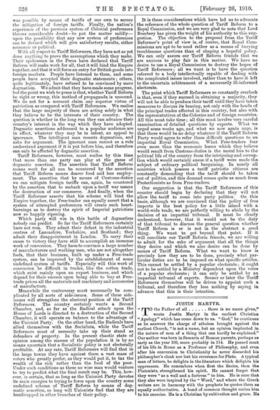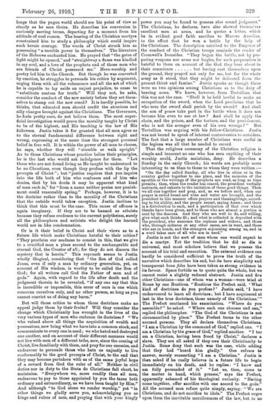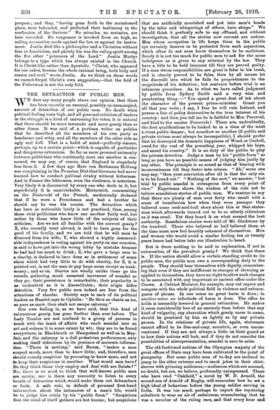JUSTIN MARTYR.
" TO the Father of all there is no name given," wrote Justin Martyr in the earliest Christian "Apology" which has come down to us. "God," he continues as he answers the charge of atheism brought against the earliest Church, "is not a name, but an opinion implanted in the nature of men of a thing that can hardly be explained." Our author was born in Samaria of Roman parents, perhaps as early as the year 100, more probably in 114. He passed most of his life in Rome as a Professor of Philosophy, and even after his conversion to Christianity he never discarded his philosopher's cloak nor lost his reverence for Plato. A typical man of letters, he delights in the literature which delights his oppressors. He remembers when first the Stoics, then the Platonists, strengthened his spirit. He cannot forget that they were "as a wall and a fortress" to him. He is sure that they also were inspired by the "Word," and where the Greek writers are in harmony with the prophets he quotes them as equally authoritative. A bond of common thought unites him to his enemies. He is a Christian by cultivation and grace. He longs that the pagan world should see his point of view as clearly as he sees theirs. He describes his conversion in curiously moving terms, departing for a moment from his attitude of cool reason. The bearing of the Christian martyrs constrained him to study a philosophy which could inspire such heroic courage. The words of Christ struck him as possessing "a terrible power in themselves." The literature of the Hebrews enchanted him. He prayed that "the gates of light might be opened," and "straightway a flame was kindled in my soul, and a love of the prophets and of those men who are friends of Christ possessed me." Hero-worship and poetry led him to the Church. But though he was converted by emotion, he struggles to persuade his critics by argument, urging them with all the vehemence and all the art of which he is capable to lay aside an unjust prejudice, to cease to "substitute custom for truth." Will they not, he asks, consider the conduct of the new society before they set them- selves to stamp out the new creed ? It is hardly possible, he thinks, that educated men should credit the atrocious and silly charges brought against the Christians. The Governors, he feels pretty sure, do not believe them. The most super- ficial investigation would prove the morality taught by Christ to be of the highest, and His teaching is the law of His followers. Justin takes it for granted that all men agree as to the eternal fundamental difference between right and wrong, expressing at the same time the strongest personal belief in free will. It is within the power of all men to choose, he says, whether they will "stumble or walk upright" As to those Christians whose practice belies their principles, be is the last who would ask indulgence for them. "Let those who are not found living as He taught be understood to be no Christians, even though they profess with the lip the precepts of Christ " ; but "justice requires that you inquire into the life both of him who confesses and of him who denies, that by his deeds it may be apparent what kind of man each is," for "from a name neither praise nor punish- ment could reasonably spring." Perhaps, however, it is to the doctrine rather than to the morality of the Christians that the outside world takes exception. Justin inclines to think that this must be the case. This cause of offence is again imaginary. If they are to be banned as atheists because they refuse credence to the current polytheism, surely all the philosophers and satirists who delight the learned world are in like condemnation.
Or is it their belief in Christ and their views as to a future life which make Christians hateful to their critics ? "They proclaim our madness to consist in this, that we give to a crucified man a place second to the unchangeable and eternal God, the Creator of all ; for they do not discern the mystery that is herein." This reproach seems to Justin wholly illogical, considering that "the Son of God called Jesus, even if only a man by ordinary generation, yet, on account of His wisdom, is worthy to be called the Son of God ; for all writers call God the Father of men and of gods." Again, with regard to the life after death and the judgment therein to be revealed, "if any one say that this is incredible or impossible, this error of ours is one which concerns ourselves only, and no other person, so long as you cannot convict us of doing any harm."
But will those critics to whom these doctrines make no appeal judge them by their fruits ? Will they consider the change which Christianity has wrought in the lives of the very various types of men who embrace its doctrines ? "We who valued above all things the acquisition of wealth and - possessions, now bring what we have into a common stock, and communicate to every one in need ; we who hated and destroyed one another, and on account of their different manners would not live with men of a different tribe, now, since the coming of Christ, live familiarly with them, and pray for our enemies, and endeavour to persuade those who hate us unjustly to live conformably to the good precepts of Christ, to the end that they may become partakers with us of the same joyful hope of a reward from God the ruler of all." Neither in civil duties nor in duty to the State do Christians fall short, he maintains. "Everywhere we, more readily than all men, endeavour to pay to those appointed by you the taxes both ordinary and extraordinary, as we have been taught by Him." And although "to God alone we render worship," yet "in other things we gladly serve you, acknowledging you as kings and rulers of men, and praying that with your kingly
power you may be found to possess also sound judgment."
The Christians, he declares, have also showed tbeinse:ves excellent men at arms, and he quotes a letter, which he in evident good faith ascribes to Marcus Aurelius, to the effect that he won a battle by the help of the Christians. The description ascribed to the Emperor of the conduct of the Christian troops reminds the reader of Cromwell's Ironsides. "They began the battle, not by pre- paring weapons nor arms nor bugles, for such preparation is hateful to them on account of the God they hear about in their conscience but having cast themselves upon the ground, they prayed not only for me, but for the whole army as it stood, that they might be delivered from the present thirst and famine." Justin speaks as though there were no two opinions among Christians as to the duty of bearing arms. We know, however, from Tertullian that this was not the case. "Shall it be held lawful to make an occupation of the sword, when the Lord proclaims that he who uses the sword shall perish by the sword ? And shall the son of peace take part in the battle when it does not become him even to sue at law ? And shall he apply the chain, and the prison, and the torture, and the punishment, who is not the avenger even of his own wrongs P" But Tertullian was arguing with his fellow-Christians. Justin was not bound to speak of internal controversies to outsiders. The fact that a large number of Christians were useful in the legions was all that he needed to record.
That the religious ceremony of the Christian religion is simple and innocent no one who has seen anything of their worship could, Justin maintains, deny. He describes a Sunday in the early Church ; his words are probably more interesting to us than to those to whom they were written :—
" On the day called Sunday, all who live in cities or in the country gather together to one place, and the memoirs of the apostles or the writings of the prophets are read, as long as time permits; then, when the reader has ceased, the president verbally instructs, and exhorts to the imitation of these good things. -Then we all rise together and pray, and, as we before said, when our prayer is ended bread and wine and water are brought, and the president in like manner offers prayers and thanksgivings, accord- ing to his ability, and the people assent, saying Amen; and there is a distribution to each, and a participation of that over which thanks have been given, and to those who are absent a portion is sent by the deacons. And they who are well to do, and willing, give what each thinks fit, and what is collected is deposited with the president, who succours the orphans and widows, and those who, through sickness or any other cause, are in want, and those who are in bonds, and the strangers sojourning among us, and in a word takes care of all who are in need."
Justin is not the sort of man whom one would expect to die a martyr. Yet the tradition that he did so die is universal, and most scholars believe that we possess the account of his trial and execution. The external evidence can hardly be considered sufficient to prove the truth of the narrative which describes his end, but its bare simplicity and
transparent bona fides have been taken as strong evidence in its favour. Space forbids us to quote quite the whole, but we cannot resist a slightly reduced abstract. Justin and five
other Christians—one of whom was a woman—were tried at Rome by one Rusticus. " Rusticus the Prefect said, 'What kind of doctrines do you profess ? ' Justin said, I have endeavoured to learn all doctrines ; but I have acquiesced at last in the true doctrines, those namely of the Christians." The Prefect continued his examination. "Where do you assemble P" he asked. "Where each one chooses and can," replied the philosopher. "The God of the Christians is not circumscribed by place." The Prefect turns to the other accused persons. They all declare themselves Christians. "I am a Christian by the command of God," replied one. "I am a Christian by the grace of God," replied another. "I too am a Christian, having been freed by Christ," declares a slave. They are all asked if they owe their Christianity to Justin. Some deny that such was the case, while adding that they had "heard him gladly." One refuses to answer, merely reasserting "I am a Christian." Justin is then asked if he really believes in a future life to begin immediately on his death, and he replies : "I know and am fully persuaded of it." "Let us, then, come to the matter in hand, which presses," says the Prefect, apparently ashamed of his theological curiosity. "Having come together, offer sacrifice with one accord to the gods." All the accused men refuse quite simply, saying "We are Christians, and do not sacrifice to idols." The Prefect urges upon them the inevitable mercilessness of the law, but to no purpose ; and they, "having gone forth to the accustomed place, were beheaded, and perfected their testimony in the confession of the Saviour." No miracles, no ecstasies, are here recorded. No vengeance is invoked from on high, no railing accusation made against the law or against its instru- ment. Justin died like a philosopher and a Christian without fear or fanaticism, and plainly his was the ruling spirit among the five other "prisoners of the Lord." Justin Martyr belongs to a type which has always existed in the Church. It is Christ-like rather than Apostolic. "Christ, who appeared for our sakes, became the whole rational being, both body and reason and soul," wrote Justin. As we think on these words we cannot forget Christ's own suggestion,—that the fold of the Fisherman is not the only fold.












































 Previous page
Previous page